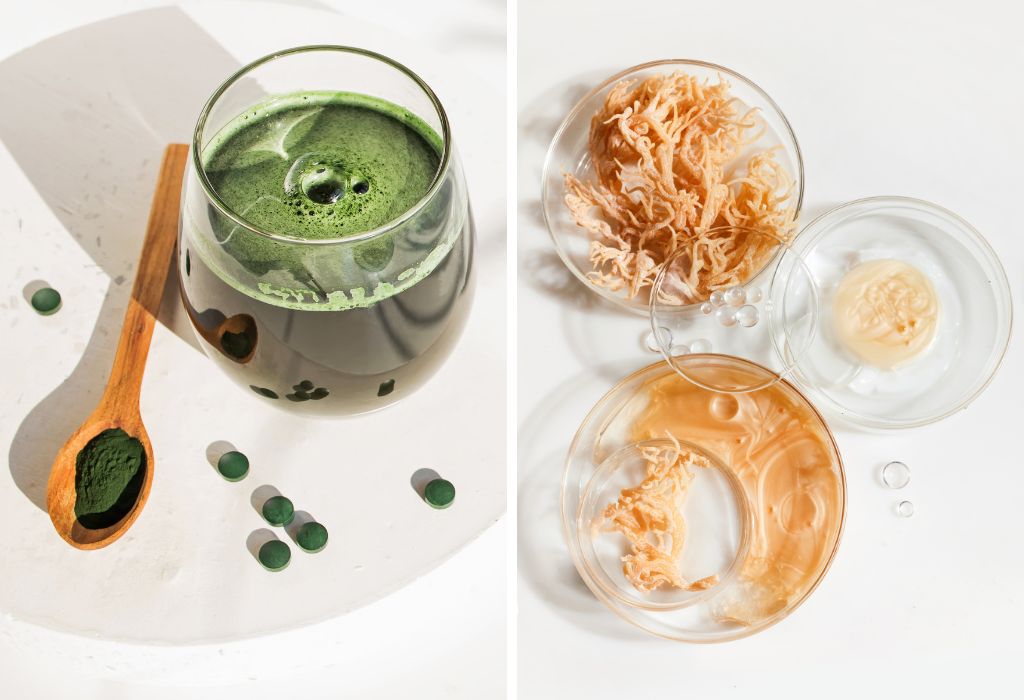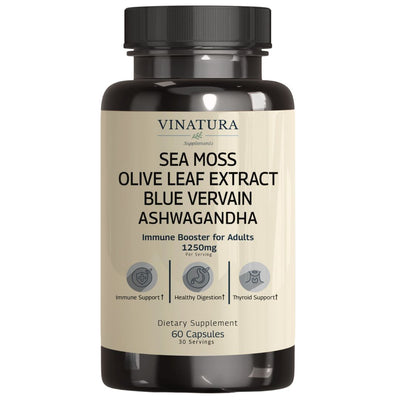
Chlorella Vs Sea Moss: Which Is Better?
Both Chlorella and Sea Moss provide excellent nutrients for the human body. However, few people know that there are specific differences between them. In this article, let's learn more about each type's benefits and nutritional content. From there, answer the question, which type is better between Chlorella and Sea Moss? Follow the information below now!
Before exploring further, please read the disclaimer located at the end of this webpage.
Key Takeaways
- Chlorella and Sea Moss are both types of algae rich in nutrients for human health.
- However, Chlorella is known for its outstanding ability to provide a complete protein source and support gut health.
- Meanwhile, Sea Moss brings outstanding benefits in providing iodine and supporting skin and hair growth.
- Which is better depends on your specific condition and health improvement goals. Be sure to consult a medical professional before taking any supplement.
What is Chlorella?

Chlorella is a genus of microscopic unicellular algae with a maximum diameter of about 10 micrometers that is packed with nutrients. Chlorella is formed by many spherical single-celled organisms multiplying during cell division. It has a characteristic dark green color because it contains a lot of chlorophyll [1].
Chlorella has been used in Asia for centuries. Recently, Chlorella has become popular as a superfood supplement in Western countries. Chlorella can be easily found worldwide in freshwater areas such as rivers and lakes [2].
Today, people often use Chlorella for health purposes with two main classifications: Chlorella Vulgaris and Chlorella Pyrenoidosa. Today, Chlorella is available in many different forms, such as powder, tablets, and liquid extract.
What is Sea Moss?

Sea Moss, whose scientific name is Chondrus Crispus, is a type of red algae that thrives in coastal waters. Sea Moss is found along North America, Europe, and the Caribbean coasts. Research shows that Sea Moss has been used since 14,000 years ago to make medicine [3].
Sea Moss is famous in the superfood world because it contains many nutrients necessary for the human body, such as vitamins A, E, and K, and minerals such as Magnesium, Calcium, and Iodine [4].
Nutrients and Health Benefits of Sea Moss and Chlorella
Both Chlorella and Sea Moss are rich sources of nutrients, providing vitamins, minerals, and antioxidants. These important nutrients contribute to improved digestion and overall health.
Digestion & Gut Health
Research shows that both Chlorella and Sea Moss have potential digestive and intestinal health benefits.
Specifically, Chlorella algae effectively promotes the activity of various immune system elements, such as natural killer cells and various interleukin molecules. Chlorella algae are also effective in enhancing enzyme function and liver health and nutrient absorption [5].
Meanwhile, Sea Moss provides prebiotic fiber, nourishing beneficial bacteria for the intestines. Prebiotics combined with probiotics creates positive changes in the functioning of the digestive system, helping to maintain the balance and diversity of intestinal bacteria [6].
These scientific findings are echoed by real users. For example, Jennifer Squires mentioned in her Amazon review that the supplement was especially helpful in supporting her gut health. Similarly, Angela Chambers also left a positive review, noting that the product worked wonderfully for her.*
Wide Range of Nutrients
Chlorella algae is classified as the most nutritious food in the world. 28g of Chlorella contains: 16g of Protein; Vitamin A - 287% RDA; Vitamin B2 - 71% RDA; Vitamin B3 - 33% RDA; Iron - 202% RDA; Magnesium - 22% RDA; Zinc 133% RDA [5].
Sea Moss contains many nutrients such as omega-3 fatty acids, vitamins A, E, K, and Magnesium. Thanks to that, Sea Moss is widely used for its antibacterial, anti-inflammatory, and anti-aging properties [6].
Complete Source of Protein
Chlorella is one of the two most protein-rich foods in the world, the other being Spirulina. Research shows that the protein content in Chlorella is up to 45%. Besides, it also provides vitamins and minerals. This proves that Chlorella is a complete protein source that is beneficial for metabolism and enhances the body's resistance [7].
High Bioavailability
Both Chlorella and Sea Moss are highly bioavailable. This means the body can absorb and use them effectively. Evidence is that both types were used hundreds of millions of years ago in folk medicine without any significant side effects being recorded.
It is worth mentioning that Sea Moss, like Chlorella and other algae, is rich in iodine, a mineral necessary for thyroid hormones in the body. It can be used as a natural source of iodine as an alternative to daily table salt [6].
Chlorella vs Sea Moss: A Comparative Analysis
Although both Chlorella and Sea Moss provide health benefits, they also have distinct differences:
Which one should you choose: Chlorella or Sea Moss?
Choosing between Chlorella and Sea Moss depends on your specific health condition and goals. If you prioritize protein supplementation and improving gut health, Chlorella is the right choice.
On the other hand, if you are looking to improve thyroid function as well as support skin and hair health, then Sea Moss is worth considering. The abundant iodine content and vitamins A, E, and K in it will support your thyroid health.
It is important to note that these supplements are not a substitute for a daily diet. You should consult a healthcare professional to determine which type is right for your health condition, Chlorella or Sea Moss.
Can I take chlorella and sea moss together?
Combining Chlorella and Sea Moss together is possible to enhance the synergistic benefits of both superfoods. Currently, there is no significant interaction between these 2 supplements, which can be safely consumed together. However, it is important to consult your doctor and start with a low dose to observe and evaluate your body's response.
How to take chlorella and sea moss together?
You can use a combination of Chlorella and Sea Moss as a dietary supplement. The combination product of Chlorella and Sea Moss comes in a variety of forms, including powders, capsules, and gels.
- Powder: Mix Chlorella and Sea Moss powder into smoothies, juice, or yogurt and drink daily.
- Capsules: Take with filtered water according to the dosage stated on the product packaging
- Gel: Use directly or add to food.
Alternative Sea Vegetables
Some other alternatives to Chlorella and Sea Moss to consider include:
- Spirulina: Richest in protein globally with protein content up to 60% and high antioxidants.
- Kelp: A brown algae rich in iodine and minerals, with similar effects to Sea Moss.
- Wakame: A type of seaweed used in cuisine, it is a rich source of fiber and vitamins for the body.
Conclusion
Chlorella and Sea Moss are exceptional superfoods that can enhance human health. Hopefully this article has provided information on the two types so you can consider and decide which type to use or a combination of both types. Consult a healthcare professional to find the right dosage for each supplement.
References
- [1] Kessler, E. (1976). Comparative physiology, biochemistry, and the taxonomy of Chlorella (Chlorophyceae). Plant Systematics and Evolution, 125(3), 129–138. https://doi.org/10.1007/bf00986146
- [2] Durdakova, M., Kolackova, M., Ridoskova, A., Cernei, N., Kristyna Pavelicova, Petr Urbis, Lukáš Richtera, Pavlína Pelcova, Adam, V., & Huska, D. (2024). Exploring the potential nutritional benefits of Arthrospira maxima and Chlorella vulgaris: A focus on vitamin B12, amino acids, and micronutrients. Food Chemistry, 139434–139434. https://doi.org/10.1016/j.foodchem.2024.139434
- [3] MacArtain, P., Gill, CIR, Brooks, M., Campbell, R., & Rowland, I.R. (2007). Nutritional value of edible seaweeds. Nutrition reviews, 65(12), 535-543
- [4] Rajapakse, N., & Kim, S.K. (2011). Nutritional and Digestive Health Benefits of Seaweed. Advances in Food and Nutrition Research, 64, 17-28
Testimonial Disclaimer
*The testimonials presented on this website are provided by individuals based on their personal experiences with our products. These testimonials represent individual opinions and experiences, which may not be typical or applicable to all users of our products. Results may vary depending on a variety of factors, including individual health, lifestyle, and adherence to product usage instructions.Author

Product Disclaimer
Including an ingredient or study does not evaluate, endorse, or recommend any Vinatura product or any third-party product. Some ingredients discussed may not be used in any Vinatura product.
The content of the articles has not been evaluated by the Food and Drug Administration (FDA) and is not intended to promote or endorse any specific product. Any products sold on this website are not intended to diagnose, treat, cure, or prevent any disease.
Opinions and Endorsements
Any claims, statements, or opinions expressed in the articles are those of the author(s) and do not necessarily reflect the views or opinions of the manufacturers of the dietary supplement products. The products sold on this website are separate from the content of the articles and are not directly endorsed or associated with the information presented here.
Liability Disclaimer
The author(s) of the articles, website, and manufacturers of the dietary supplement products do not assume any liability for any potential consequences arising from the use of the information provided in the articles. Ingredient effects, dosages, and safety vary by individual, formulation, and context; some ingredients interact with medications or may be unsuitable during pregnancy or lactation. It is recommended that individuals consult with a qualified healthcare professional before making any dietary or lifestyle changes, including the use of dietary supplements.
Product Usage
Please refer to the product labels and packaging for specific usage instructions and guidelines for the dietary supplement products sold on this website.
Customer Support
For any concerns or questions regarding the dietary supplement products, please contact our customer support team, who will be more than happy to assist you.





Leave a Comment
Be the first to comment.
What do you think?